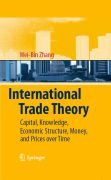
International trade theory: capital, knowledge, economic structure, money, and prices over time
Zhang, W.
The development of international trade theory has created a wide array of different theories, concepts and results. Economic students are trained to understand international interactions by severally incompatible theories one by one in the same course. In order to overcome incoherence among multiple theories, we need a general theoretical framework which enables us to account for the phenomena explained by the current theories in a unified manner to draw togetherall of the disparate branches of trade theory into a single organized system of knowledge. This book provides a powerful - but easy to operate - engine of analysis that sheds light not only on trade theory per se, but on many other dimensions that interact with trade, including inequality, saving propensities,education, research policy, and knowledge. The book starts with the traditional static trade theories. Then, it develops dynamic models with capital and knowledge under perfect competition and/or monopolistic competition. New approach introducing a novel economic mechanism to determine consumers' decision on consumption and savings International trade theory integrating economic growth,monetary, and value theories Using novel utility functions Numerous examples and figures Overview on the contemporary literature in international trade andtheory
- ISBN: 978-3-540-78264-3
- Editorial: Springer
- Encuadernacion: Cartoné
- Páginas: 515
- Fecha Publicación: 01/04/2008
- Nº Volúmenes: 1
- Idioma: Inglés
